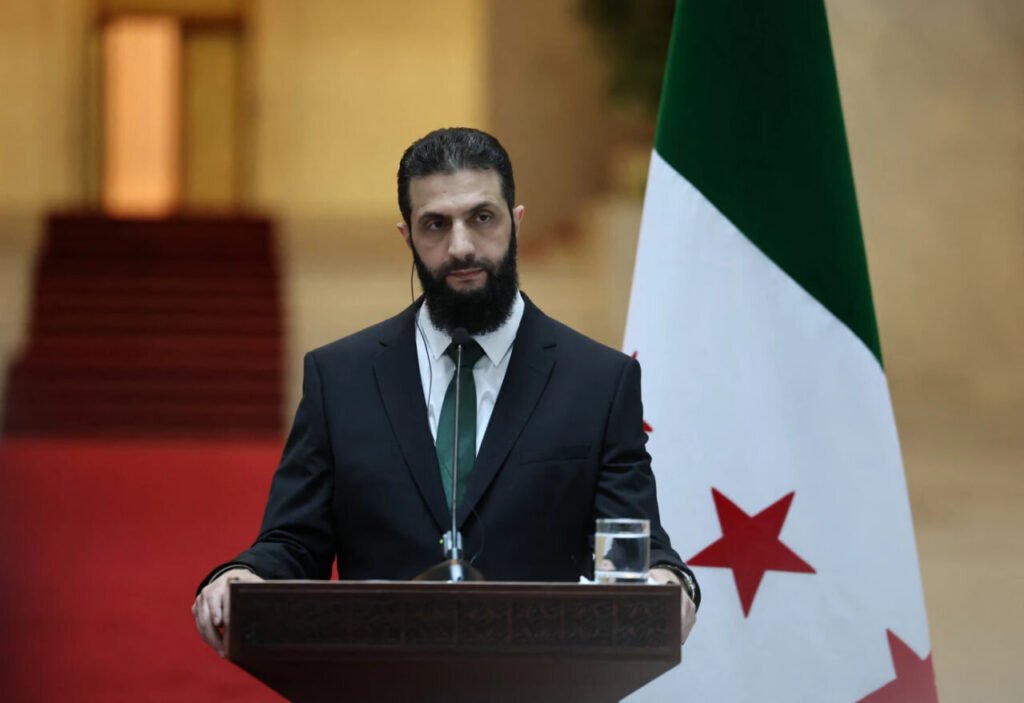Tehran – Syrian self-appointed Ahmad al-Sharah was significantly absent from the Arab League meeting in Baghdad, the capital of Iraq.
A brief statement from Alshara’s office did not provide any reason for his absence. However, his invitation by the Iraqi government last month sparked a fierce political backlash, rekindling the deep sector beyond Iraq’s political landscape.
Iraq and Syria relations are becoming more and more difficult as Alshara took over power following the sudden fall of Bashar al-Assad in December.
The controversy stems mainly from the past of Alshara. Before emergence as Syria’s new leader, he was a senior member of Iraq’s al-Qaeda (AQI), the group responsible for some of the most deadly terrorist attacks in the aftermath of the 2003 US invasion.
Al-Sharaa, who is active in Abu Mohammed Al-Golani, played a key role in AQI’s brutal campaign. This targeted Iraqi civilians and security forces with indiscriminate sectarian violence throughout the 2000s.
The group’s terrifying legacy still casts a long shadow over Iraq, with Alshara being hoped for terrorist charges in Iraq’s court.
Former Iraqi Interior Minister Bakil Jabul Al Zobedi has released previously undisclosed details about the self-appointed Syrian president.
“During my tenure as Minister of Home Affairs, Al Golani was active in Iraq,” said Al Zovedi. “At that time I received an information report showing his presence in Diyala.”
However, according to Al-Zubeidi, it was later revealed that the US military was monitoring communications in Iraq. “They eavesdropped on us, first they captured him and took him to Bukka,” he said.
Al-Zubeidi said he contacted then-US commander General George Casey to request custody of Al-Golani. “He refused,” said Al Zovedi. “He told me.
By 2014, Argolani had been moved to Abu Ghraib Prison. “You may remember the infamous prison break, when terrorists blew through the gates and fled in a waiting vehicle,” said Al Zovedi. “Al Golani was in it and fled to Syria, where he later re-emerged as the leader of Heiat Taharil al-Sham (HTS – formerly the Syrian branch of al-Qaeda).”
In the weeks leading up to the Arab League Summit, at least 50 Iraqi lawmakers filed legal complaints against the Syrian president.
The Dawa Party, which ruled Iraq during AQI’s most violent years, warned him against his attendance. While not directly name Al-Sharaa, the party argued that those invited to the summit must have “clean” legal records both at home and abroad.
Alshara’s presence would have marked a great iconic victory for Damascus as his government was trying to rebuild diplomatic relations with his Arab neighbors.
However, the growing anger within Iraq over his terrorist past and his fear of personal security seem to have forced him to be taken away from his departure.
The observer notes that despite his new role as head of state, Alsharaa has yet to completely distance himself from his terrifying history.
Alshara has not denied past affiliation with AQI or other terrorist groups, but he claims he is young and has since distanced himself from those actions.
Still, AQI was responsible for some of Iraq’s most horrifying massacres and played a central role in the sectarian violence that plagued the country, particularly between 2004 and 2007.
“A Syrian official later sent a message to me on WhatsApp, claiming that Al Golani was “just a young man caught up in an event,” Al Zovedi revealed. “I answered: “We reject this false story. He is responsible for the blood of Iraq, spilled by Dash and Al-Gorani of Abu Bakr al-Baghdadi himself.” Those killed, as government officials, must hold him accountable. ”
When asked about Alshara’s role in Iraq, Alzbedi was clear:
“Algolani ultimately took on leadership in Dash’s operations in Syria, and fought brutal wars until foreign powers intervened, including the Turkish army, the Israeli intelligence agency and the US forces in northern Syria.
“These foreign powers” and Al Zobedi concluded that “there are long-term agendas that inevitably affect both Jordan and Iraq.”

